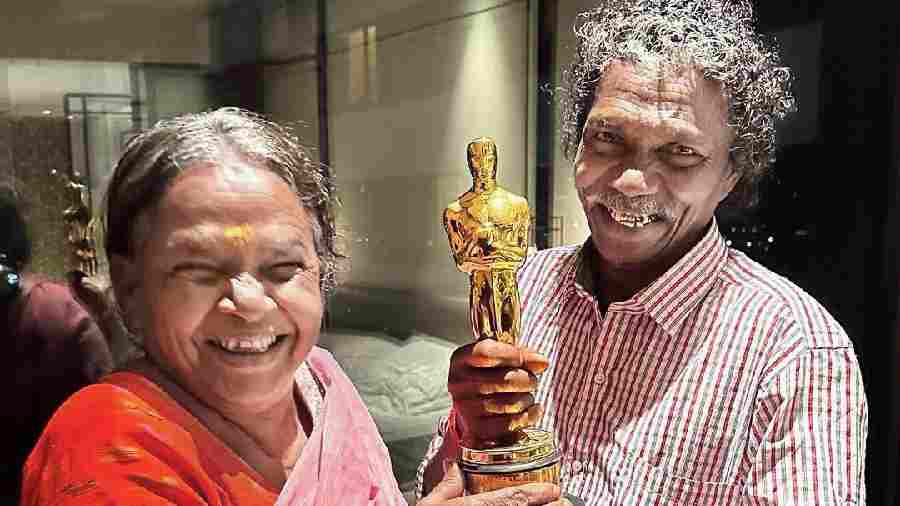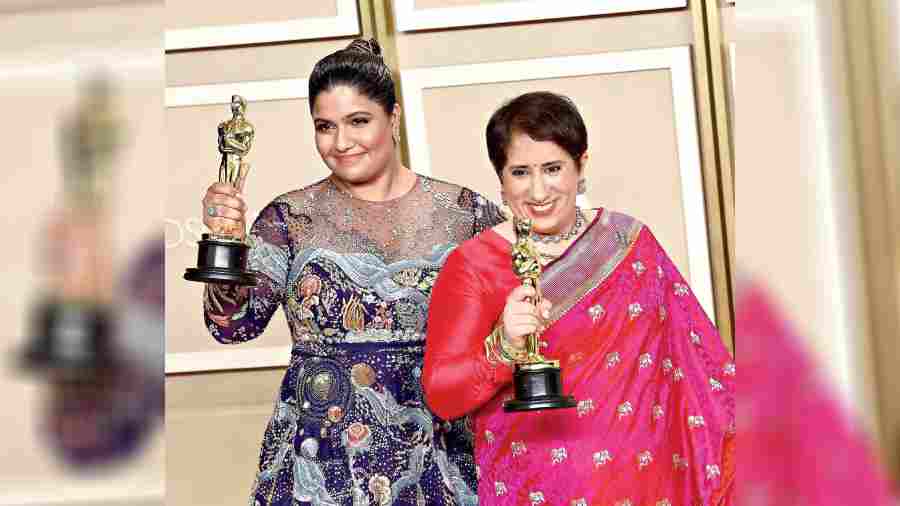It's been just a month since the Academy Awards and quite understandably, Guneet Monga is still on cloud nine. The producer, who put in her all to back The Elephant Whisperers, stood tall on the stage of the Dolby Theatre in Los Angeles on the night of March 13, triumphantly holding up the Oscar statuette — the film's director Kartiki Gonsalves for company — for Best Documentary Short Film, the first Indian film to win an Academy Award in that category.
Since then, it has been a euphoric month for Guneet and Kartiki, who have been feted with awards and accolades, earning an audience with Prime Minister Narendra Modi, President Draupadi Murmu, and sharing the spotlight with Bomman and Bellie, the indigenous couple at the heart of The Elephant Whisperers, whose sensitivity and care for the elephant Raghu, made the film happen in the first place.
This is, of course, the second Oscar call-up for Guneet. Her first was in 2019 as co-producer for the documentary short film Period. End Of Sentence, directed by Iranian-American filmmaker Rayka Zehtabch, which follows a group of local women in a village in Uttar Pradesh, as they learn how to operate a machine that makes low-cost, biodegradable sanitary pads, which they sell to other women at affordable prices.
About 13 years ago, her first short film — Kavi — cracked the top five at the 2010 Academy Awards. But over and above everything else, Guneet has been the champion of independent cinema, taking our movies to the world long before anyone else did. The Telegraph chatted with Guneet on that jubilant night and the way forward.

Bellie and Bomman with the Oscar
Congratulations once again! Has the feeling sunk in yet?
The joy increases with every passing day, especially because every day since the win, I have been meeting people who are just as euphoric about the honour that we have received as much as we are. In fact, today is my Day One since the win of going back to work and doing what I do best... which is making movies.
It's been the small things as well as the big things, you know. The other day I went to the office of another company and everyone just stood up and said 'congratulations'. It was very sweet, it's very beautiful.
What's been the most heartwarming gesture that's come your way since the win?
That would be the welcome at Amritsar by (Michelin-starred chef) Vikas Khanna's mother. They gave me a suit and took care of my family. We had these lovely kids welcoming us at the airport. Vikas made parathas... it was too cute, it was too kind. His mother had made a promise that she would drive me to the Golden Temple if we won the Oscar, and she did just that.
What was the first thing that came to your mind when your name was announced at the Dolby Theatre?
I just said 'Thank you' to my parents and my guru. I was like, 'Oh my God! How long I have wished for this!' And now that it has happened, I am very, very grateful for it.
Your co-production Period. End of Sentence won an Oscar in 2019. What was special about this time and being on that stage?
It was surreal being on stage and looking at the whole of Dolby Theatre from that end. It's huge! What struck me was how high the auditorium is(smiles). It's stunning!
I had eye contact with Ava DuVernay and Riz Ahmed and I said 'thank you' to them because they were cheering us on from the ground floor orchestra level. I tried looking up at my husband and all the crew (of The Elephant Whisperers) sitting at the third level. Neechey se toh ekdum nahin dikh rahein thhe! (Laughs)
And was wearing that stunning pink Banarasi sari always on the cards?
Always! There were many other sari options, but I leaned towards that particular one because it was so beautiful and rich in colour.
Does all the appreciation and accolades that have followed the win compensate for the fact that you didn't have the time to make a speech on stage?
Oh, I am not worried about that! I am going to go back and win another one and make my speech (smiles). During Period. End of Sentence, only my name was announced... I didn't go up on stage. At that time, I had told myself, 'It's okay, I will go up on stage one day and get my own trophy'. When Kavi was shortlisted, I was like, 'Mujhe apne naam ki trophy chahiye'. And now that I have a trophy in my name, I will go back someday for a speech (smiles). It will happen!
At the grassroot level, what has this win done for Bomman and Bellie and for the larger cause of elephant preservation and care?
The Tamil Nadu government has provided cash grants to them as well as to all other mahouts. There has also been a lot of help extended to develop the area. More than anything, the Prime Minister visited the Mudumalai Tiger Reserve and met them. They are so happy about it! The state forest department in Tamil Nadu has done a phenomenal job. Mahouts are actually saving elephant calves.
Your production Sikhya Entertainment turned 15 on April 1. What would you pick as the highlights of the journey so far?
Our first high point was Peddlers (director Vasan Bala's debut) which took us to Cannes and unfortunately, it never released. Then it would be The Lunchbox, then Pagglait and Soorarai Pottru in Tamil. And, of course, Masaan.
Pagglait is very close to me because of Umesh sir (Bisht, the film's director) and how our partnership grew so much, as well as my equation with Sanya (Malhotra). Making that film gave us a lot of joy.
Soorarai Pottru was our foray into Tamil cinema and it was so nice to work with Suriya (who co-produced the film with Guneet and also acted in the film) and Sudha (Kongara, director). There is so much gratitude for how far we have come.
Does the Oscar alter or influence Sikhya's vision for the future in any way?
I want to do more mainstream films. I also want to do films that will travel all over the world. When I worked for (film-maker) Anurag Kashyap, a lot of my learning was how to take our films internationally. My work with Sikhya has been about deepening our space in India. We will continue to tell local stories that can speak to a global audience and I hope we can work more towards financing our films from India as well as the West.
Standing where you are today, what would you tell the Guneet of two decades ago who came to Bombay with a dream and wanted to achieve the impossible?
A very basic thing — take care of your health. Everything will happen in its own time, but taking care of health is important. Joining therapy early is important. Work out, eat well and show up for yourself first. I have always shown up for my projects and my directors, but I just didn't show up for myself. I wish I had told that to myself earlier.
